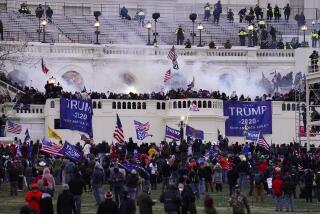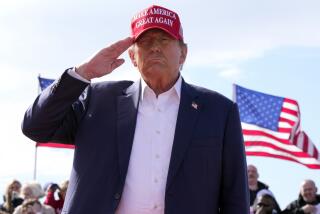What to expect as the Jan. 6 committee hearings begin today
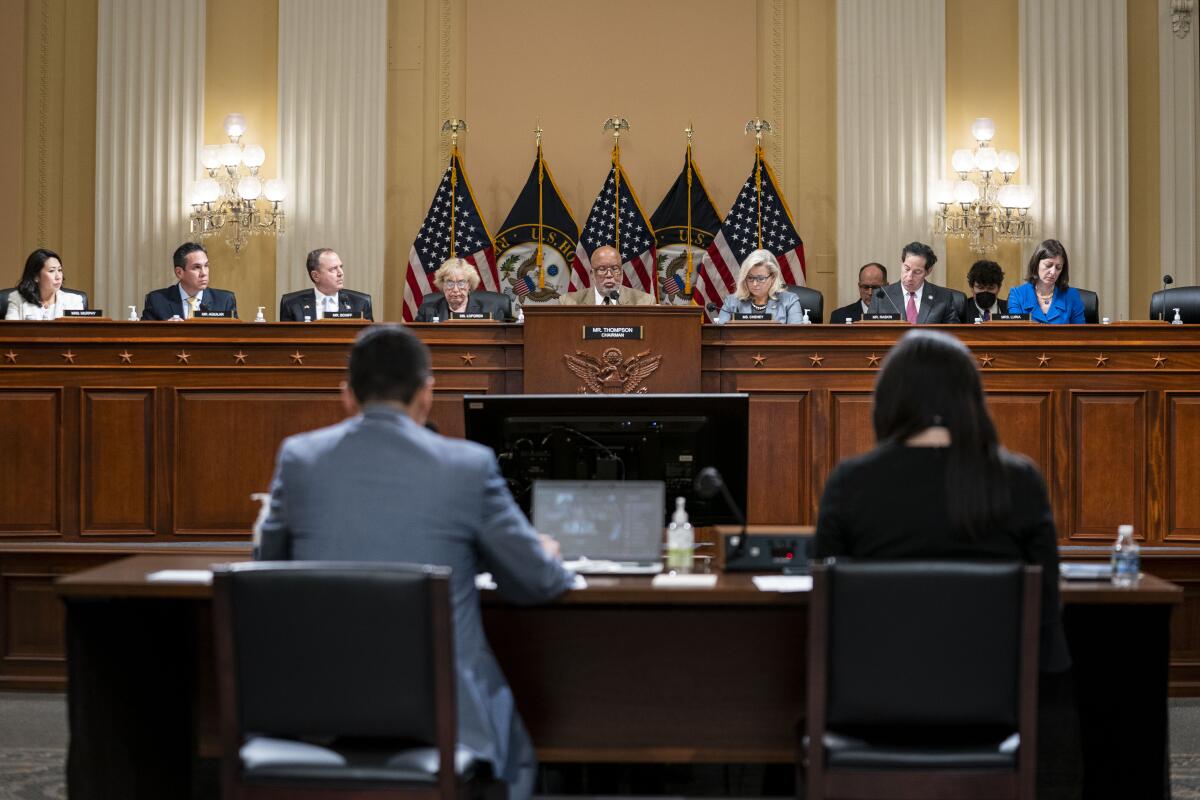
- Share via
WASHINGTON — Hearings detailing the largest-scale investigation in congressional history begin Thursday, as the House Jan. 6 select committee works to explain how former President Trump’s false claims that the election was stolen boiled over to a riot in which more than a thousand Americans overwhelmed police and stormed the Capitol in an effort to stop the peaceful transition of power.
For just under a year, the committee has operated almost exclusively behind closed doors, hiring some of the nation’s top former prosecutors to conduct more than 1,000 depositions and collect more than 140,000 emails, phone records, internal memos and other documents, including presidential records from the National Archives.
Information gathering continues even as the three weeks of hearings are set to begin. The committee spoke with former Trump Atty. Gen. William Barr last week and is still fighting for access to records and testimony in at least two dozen court cases.
Though some information has leaked or been released as exhibits in the pending court cases, exactly who the committee has interviewed and what it learned has been tightly held under wraps. Only a tenth of the witnesses interviewed had to be compelled to speak with a subpoena, and committee aides said most of what will be shown Thursday will be never-before-revealed information.
“We will be revealing new details showing that the violence on Jan. 6 was the result of a coordinated multistep effort to overturn the results of the 2020 election and stop the transfer of power from Donald Trump to Joe Biden. And indeed, [that] Donald Trump was at the center of that effort,” said an aide speaking on background to reporters.
Several committee members or staff have suggested their findings are explosive.
“The committee has found evidence of concerted planning and premeditated activity. The idea that all of this was just a rowdy demonstration that spontaneously got a little bit out of control is absurd. You don’t almost knock over the U.S. government by accident,” Rep. Jamie Raskin (D-Md.) told the Washington Post this week.
The hearings have the makings of a pivotal moment in American history on par with the 1973 House Watergate hearings or the 1954 McCarthy hearings, said Michael Waldman, president of the Brennan Center for Justice at New York University School of Law.
“This is likely to be the most significant set of congressional hearings in decades,” Waldman said. “Great congressional investigations have played a big role in American history. They’ve been really significant. They’ve brought public attention. They’ve produced legislation. They’ve driven scandals. And this has the makings of that.”
To be successful, the committee needs to take bipartisanship seriously, be disciplined when asking questions in public and tell a compelling story, he said.
“There’s a template for how to do this right. And, of course, what we don’t know is how this will all play out in the modern media environment, where everything is so polarized,” Waldman said.
All major network and cable news channels except for Fox News are expected to broadcast the first prime-time hearing, which is set for 5 p.m. Pacific time Thursday.
But the question remains: Will Americans tune in to hear details of an investigation into an attack that occurred more than a year ago?
Partisan fireworks similar to those that marked the 2014 and 2015 hearings over the attack on the American diplomatic mission in Benghazi, Libya, are unlikely.
After killing an effort to create an independent, nonpartisan commission to study the attack, Republicans elected not to officially participate in the committee after House Speaker Nancy Pelosi (D-San Francisco) rejected two of the representatives House Minority Leader Kevin McCarthy (R-Bakersfield) selected to serve on the panel who were deemed to be hostile to its mission.
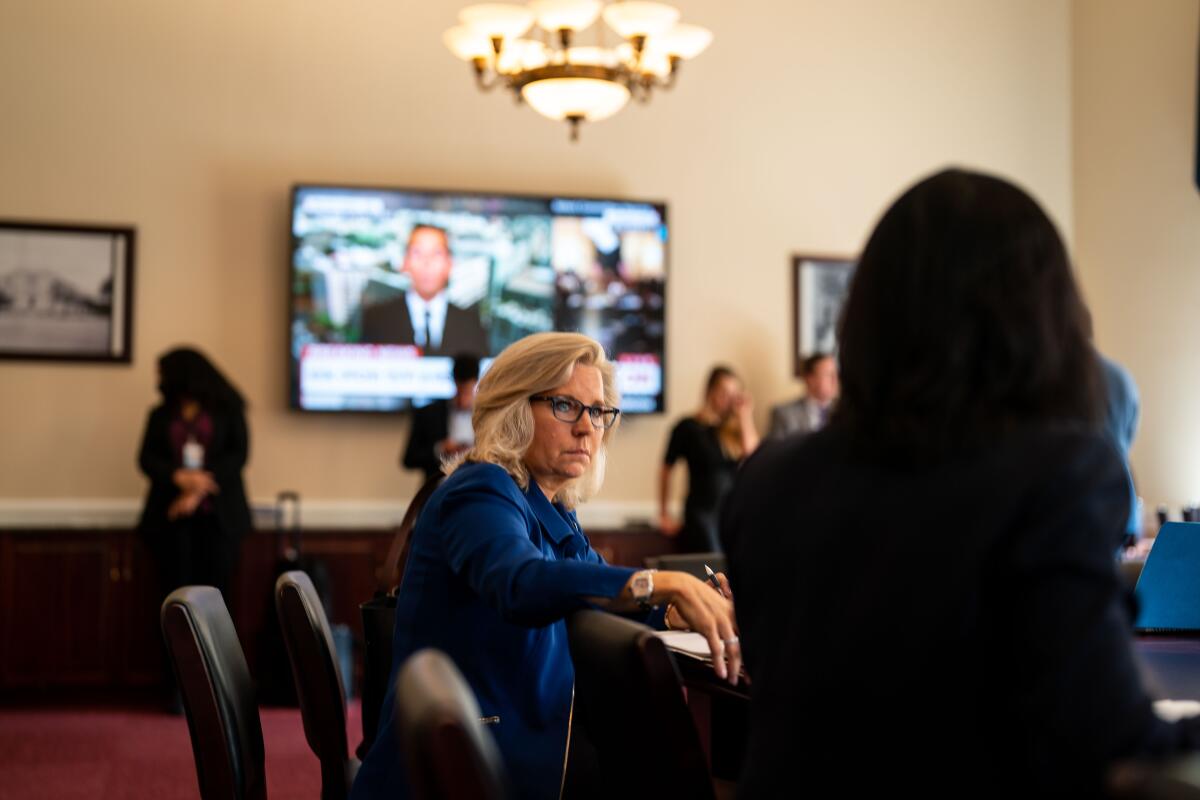
Just two Republicans are on the committee, Vice Chairwoman Rep. Liz Cheney (R-Wyo.), who lost her position leading the House Republican Conference for criticizing Trump’s role in the insurrection, and Rep. Adam Kinzinger (R-Ill.).
Both are serving at Pelosi’s request and have been censured by the Republican National Committee for participating. Their presence has made it difficult for conservatives to characterize the committee as a purely partisan effort.
Without Trump supporters on the committee, the GOP response has largely been relegated to a flood of rebuttals after the hearings.
“The role of Liz Cheney in this cannot be understated, how significant that is. She was, at the time of the insurrection, the chair of the House Republican caucus. She’s very gutsy. And has been a central mover of this committee. I think it’s likely we’ll see that” Thursday, Waldman said.
Each hearing is expected to include a mix of live witnesses as well as video footage of the riot itself and some of the recorded depositions.
Witnesses scheduled to testify at Thursday’s hearing are Capitol Police Officer Caroline Edwards, the first law enforcement officer injured by rioters; and Nick Quested, a documentary filmmaker who was filming the far-right Proud Boys extremist group that day and got footage of some of the earliest violence.
Committee aides said they expect Edwards and Quested to discuss what they heard from rioters in the crowd as the violence began. The hearing will also include a multimedia presentation that shows testimony from senior White House officials, senior administration officials, campaign staff and members of Trump’s family.
The committee has had to distill a mountain of evidence into a narrative that can keep public attention for weeks.
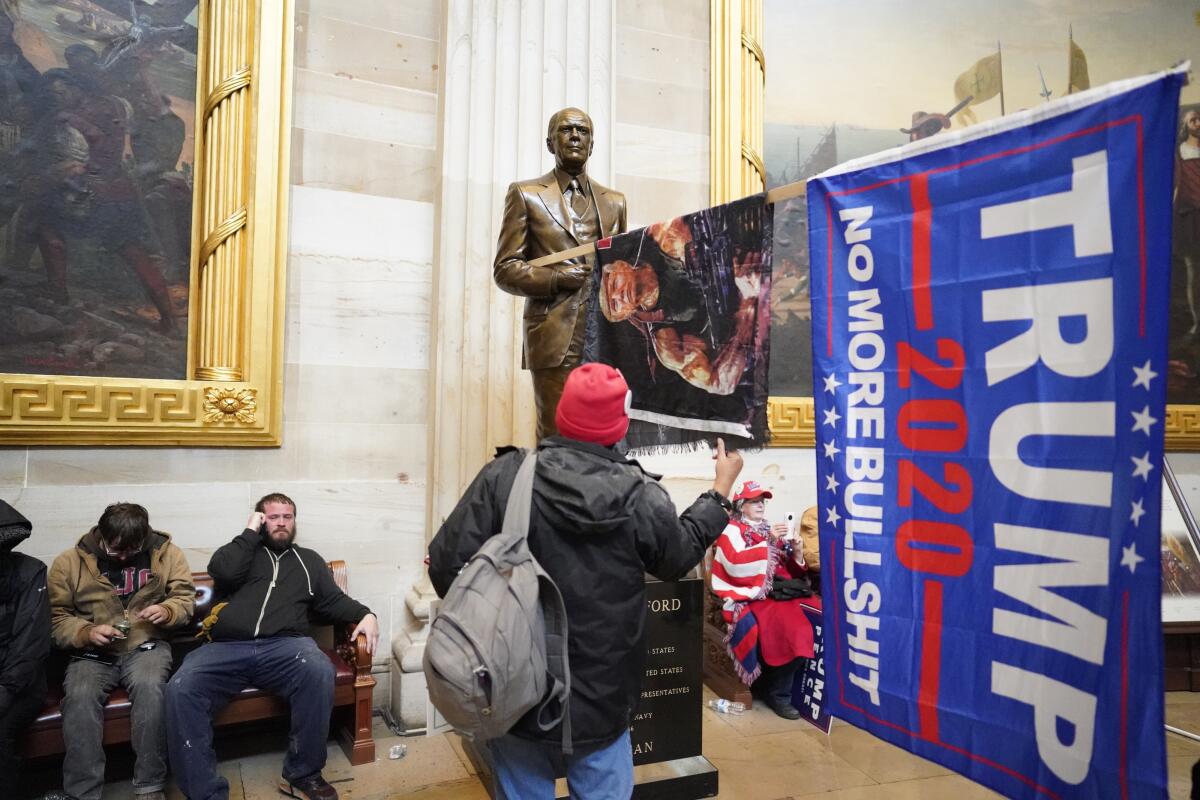
Details of the other five expected hearings haven’t been disclosed, but what has leaked leads to a series of questions for the committee to answer.
The biggest unknown is what did Trump know and when did he know it?
Trump spoke at the “Stop the Steal” rally outside the White House at 11:57 a.m., telling the crowd, “We fight like hell, and if you don’t fight like hell you’re not going to have a country anymore.” He released a video on Twitter at 4:17 p.m. urging those at the Capitol to go home.
“I know your pain. I know you’re hurt. We have to have peace. We have to have law and order. We have to respect our great people in law and order,” Trump said in the video. “We don’t want anybody hurt. So go home. We love you, you’re very special. You’ve seen what happens, you see the way others are treated that are so bad and so evil. I know how you feel, but go home and go home in peace.”
The committee will try to answer in its hearings the question of what happened in the intervening 187 minutes.
Was Trump cheering on the rioters and suggesting it was a shame that Vice President Mike Pence wasn’t hanged, as New York Times reporting has suggested? Why didn’t he speak with military and civilian leaders as they sought to gain control of the situation, including at 6 p.m. and 7 p.m. meetings in the situation room?
Another major unknown likely to be addressed is what contact did Trump and his team have with members of Congress leading up to Jan. 6, how did the plan to contest electoral college votes in key states, and what contact did Trump have with members during the insurrection itself?
Some of these details have come out, including plans to challenge results in seven states, the pressure campaign on elected state officials to conduct audits and find extra votes, and the attempt to install a pro-Trump attorney general who would announce widespread election fraud. And there has been some public reporting about representatives and senators with whom Trump spoke during the riot, with much of the information coming from texts that White House Chief of Staff Mark Meadows provided to the committee before he stopped cooperating.
The committee is also examining why law enforcement, particularly Capitol Police, was caught by surprise with regard to the size of the crowd and its aggression.
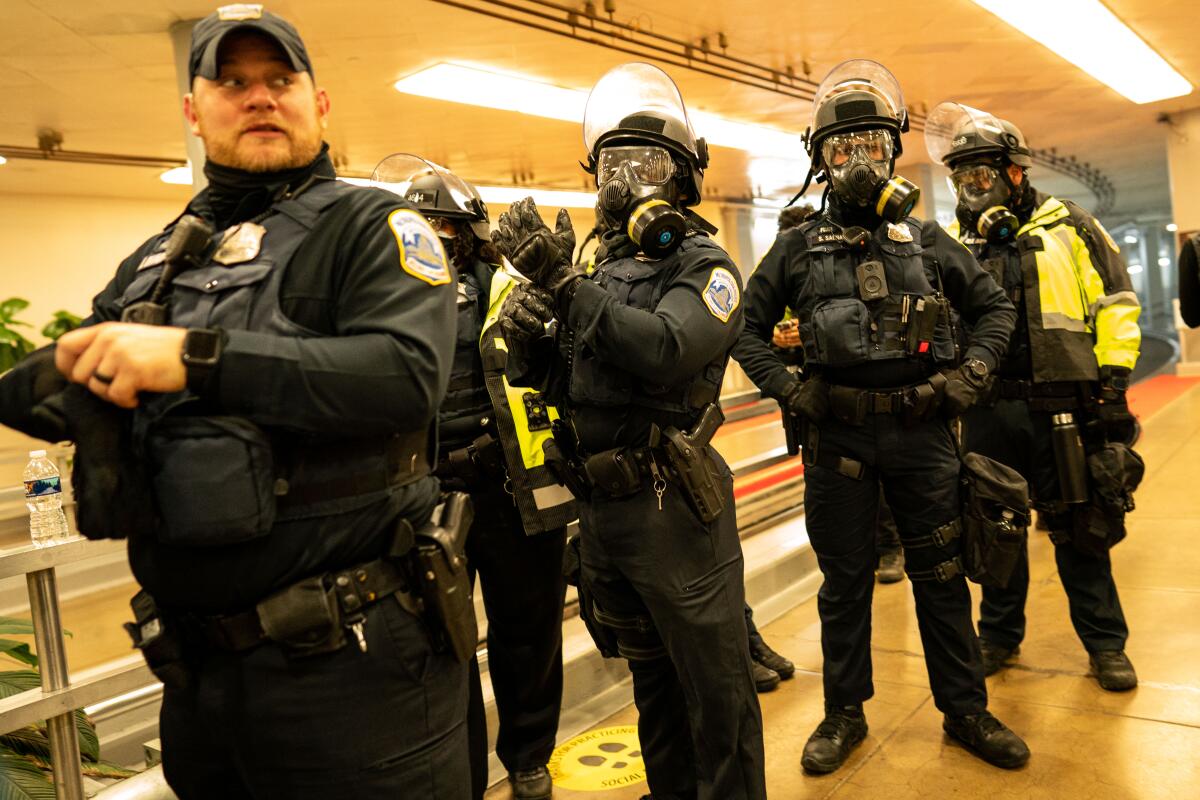
Trump had touted the rally repeatedly, with social media chatter increasing about the rally becoming violent in the days before Jan. 6. Various intelligence agencies were aware of the potential for violence, but Capitol Police officers couldn’t access all of their riot gear, and it took several hours to deploy the National Guard. The events led to questions about where the communication breakdown occurred, why Capitol Police were so easily overrun by rioters and what level of force were they authorized to use.
Former Sen. Doug Jones (D-Ala.), who is now a senior fellow with the liberal think tank Center for American Progress, said the committee members seem to recognize that their role is to be fact finders, not prosecutors.
The Department of Justice is conducting its own investigation examining whether laws were broken between election day and Jan. 6, and the committee members have debated whether to recommend criminal charges for Trump and others.
“They should not give the American public the perception that this is an attack on Donald Trump. They are finding facts. This is truly an attack on democracy; the facts are going to speak for themselves,” Jones said. “It’s going to be difficult for them to walk that fine line continuing to be the fact finder and not prosecute. It is not their job, in my view, to prosecute.”
Committee members stress that the hearings aren’t the end of their investigation. Several high-profile witnesses have gone to court over the committee’s attempts to obtain information and in many cases were successful in keeping the panel from getting the requested information or testimony before the hearings began. Two dozen lawsuits are pending over whether the committee can compel testimony and whether communications companies can hand over subpoenaed call records and emails.
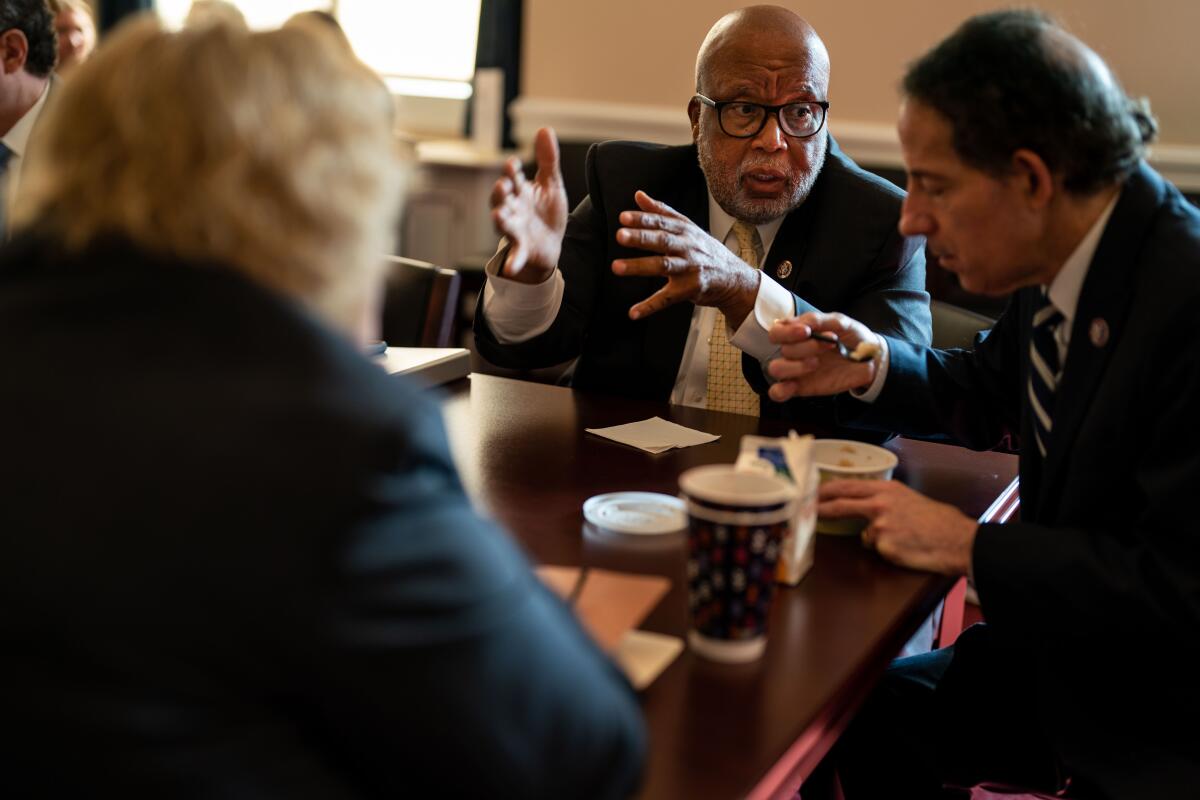
Explosive testimony or documents from people like Meadows are unlikely at this point, but hundreds of interviews with staff and less recalcitrant witnesses have committee members confident that they’ll be able to tell the full story of Trump and his allies’ attempt to overturn the election.
Those interviews have allowed the committee to compile a nearly minute-by-minute account of what occurred at the White House on Jan. 6, including while rioters stormed the Capitol.
Partial depositions included as exhibits in some of the pending court cases show the staffers recalling details such as who was in the Oval Office, whom Meadows spoke with and when Trump’s adult children pleaded with him to decry the violence and order his supporters to go home. The committee also recently interviewed the former president’s daughter, Ivanka Trump.
Over at least three interviews, Meadows aide Cassidy Hutchinson provided some of the most granular details that the committee is expected to provide about Meadows’ actions before Jan. 6, including which members of Congress he met with to discuss challenging state election results, and during the riot as he fielded frantic text messages from Republican lawmakers and allied media personalities.
Potential witnesses still in litigation with the committee include Meadows, Trump’s former attorney Sidney Powell, right-wing media personalities like Alex Jones and several people involved in organizing the rally before the insurrection.
The investigation is expected to culminate in a comprehensive report released later this year.
More to Read
Get the L.A. Times Politics newsletter
Deeply reported insights into legislation, politics and policy from Sacramento, Washington and beyond. In your inbox twice per week.
You may occasionally receive promotional content from the Los Angeles Times.

